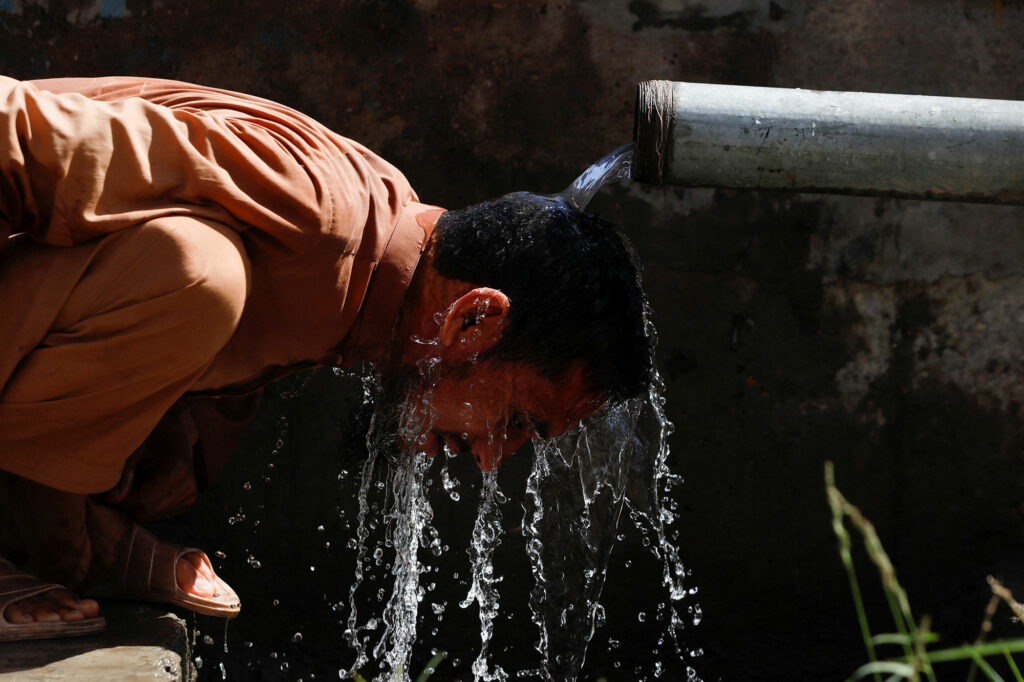Power cuts in India and Pakistan on Friday worsened the living conditions of millions of residents, already overwhelmed by a record heat wave that experts link to climate change. Unusually hot March and April drove up energy demand in India, and especially in Pakistan, so that power plants are now running out of coal to meet demand.
Several Pakistani towns suffered up to eight hours of power cuts a day last week, while rural areas suffered power cuts for half the day. « There is an electricity crisis and load shedding across the country, » said Energy Minister Khurram Dastgir Khan, referring to shortages and « technical failures ».
From Saturday, temperatures will reach 49-52°C in #Pakistan & in #India for at least 4 affiliate days.
These temperatures, close to records, have lasted since March 10. The duration accentuates the arduousness. It must be considered, more than the daily values. pic.twitter.com/DFHyrPHPYD— Dr. Serge Zaka (Dr. Zarge) (@SergeZaka) May 3, 2022
However, temperatures are expected to be 8 degrees above seasonal normal in parts of Pakistan, peaking at 48 degrees in parts of rural Sindh on Wednesday, according to the Pakistan Meteorological Society.
« Disastrous situation »
Scientists say that due to climate change, heat waves are more frequent but also more severe. In the Indian megalopolis of New Delhi, where the temperature reached 43.5 ° C on Friday, the authorities estimate that there is « less than a day’s worth of coal » in stock in many power stations.
« The situation across India is dire, » said Arvind Kejriwal, Delhi’s chief minister, who warned of possible cuts to hospitals and the capital’s metro.
India has even canceled some passenger trains to speed up the delivery of coal to power plants, according to Bloomberg News.
Coal reserves at Indian power plants have indeed fallen by almost 17% since the beginning of April, falling to barely a third of the required levels, according to the same source.
Forests in ashes
In Calcutta, in eastern India, after a series of illnesses in public transport, sugar water was distributed to passengers. « Without rain for more than 57 days, Kolkata is in the grip of the longest drought in this millennium, » said Sanjit Bandyopadhyay of the Regional Meteorological Center.
At this time of year, in the highlands of the state of Himachal Pradesh, rain, hail and even snow are falling normally, but for two months not a drop of water and the temperatures are breaking records.
As a result, hundreds of fires have reduced pine forests to ashes, especially around Dharamsala, the city where the Dalai Lama lives. « Most of these fires are ground fires that spread through the pine forests, which are the most vulnerable to fires, » state forestry chief Ajay Srivastava told AFP. « Teams of firefighters are working hard to put out these fires and also to save wild animals, » he added, adding that the emergency services had to ask for help from local residents.
pink elixir
For Muslims observing Ramadan, the heat has made fasting painful. As the sun set, vendors did a thriving trade in Rooh Afza, a pink, sweet elixir that has been popular for generations on the subcontinent to quench thirst. The heat wave also led to the closure of schools or the reduction of class hours.
In Patna, the state capital of Bihar, sunstroke has increased over the past ten days, as have the number of children suffering from fever, vomiting and diarrhoea. The authorities ordered the end of classes at 10:45 a.m. and recommended not to go out in the afternoon.
A plague for the economy because if « people stay at home during the day, we are struggling to earn our living », sums up a rickshaw driver, Rameshwar Paswan.

